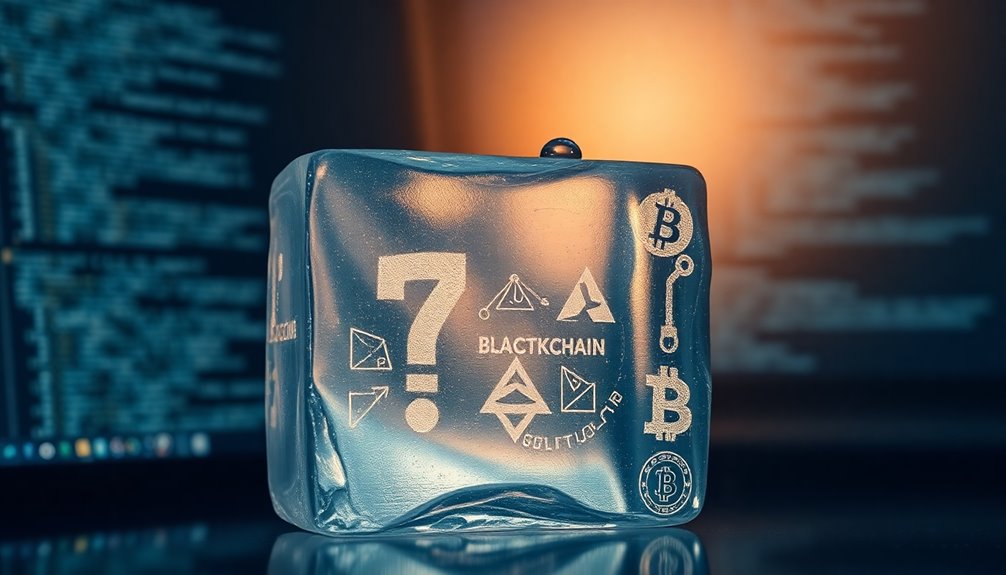Yes, crypto is traceable due to its unique setup on the blockchain. Each transaction gets logged on a public ledger, making it secure yet visible to all. While your personal info remains hidden behind pseudonymous addresses, the transaction details are out there for anyone to see. This means you can track where your coins go, but it also highlights the balance between privacy and transparency. For those really seeking to keep things private, there are specialized wallets that enhance anonymity. There's a lot to explore about how this all works and what it means for you!
Key Takeaways
- Cryptocurrency transactions are recorded on a public ledger, making them traceable despite user pseudonymity.
- Advanced cryptographic techniques, like Zero-Knowledge Proofs, maintain confidentiality while allowing transaction existence to be verified.
- Pseudonymity complicates personal identification, which can both protect privacy and hinder accountability in financial activities.
- Privacy-focused wallets aim to enhance user anonymity, but may also invite regulatory scrutiny due to potential misuse.
- Balancing privacy and transparency is crucial for secure transactions, influencing the adoption of various wallet features and market trends.
Blockchain Fundamentals and Terminology

When you dive into blockchain fundamentals, you'll discover that this technology is built on a structured system of interconnected blocks. Each block contains valuable data, like a digital box filled with important information. These blocks are linked by hash values, which act like unique fingerprints, ensuring everything's in order. One cool aspect is that the information is immutable; it can't be deleted or changed. Instead, new blocks are added to update the data. Plus, a decentralized network of computers, called nodes, keeps everything secure, so no single entity controls the data. To maintain trust, these nodes use a consensus mechanism, where they vote to verify each block's accuracy. This teamwork keeps the blockchain running smoothly! The introduction of decentralized solutions like blockchain has transformed how we manage and secure data.
Understanding Blockchain's Privacy Features

Blockchain technology not only offers a secure and decentralized way to store data but also incorporates several privacy features that protect user identities and transaction details. You'll find that it uses public and private keys, creating pseudonymous identities for users. By avoiding address reuse, your transactions become harder to trace. Plus, advanced cryptographic techniques, like Zero-Knowledge Proofs, ensure that only involved parties can see the transaction details. This means that while everyone can see a transaction happened, the specifics stay hidden. With these layers of confidentiality and history masking, your financial activities can remain private. Additionally, the implementation of privacy solutions like hash-pinning further enhances the integrity of transaction data while keeping it confidential.
Transaction Verification Process

While navigating the world of cryptocurrency, understanding the transaction verification process is crucial for ensuring your transactions are secure and valid.
It all begins with generating a unique transaction ID (TxID) that acts like a fingerprint for your transaction. You can then input this TxID into the appropriate blockchain website to check its status. This shows you how many confirmations your transaction has, which means it's been recorded securely. The verification process is essential for maintaining security and trust in the transaction process.
The process uses cryptographic hash functions and digital signatures to keep everything safe. Multiple nodes work together to verify each transaction, making it hard for anyone to cheat the system.
With these steps, you can feel confident that your cryptocurrency transactions are both accurate and protected.
Pros and Cons of Anonymity

Anonymity in cryptocurrency offers a mix of benefits and drawbacks that can significantly impact your experience as a user.
On the plus side, you enjoy enhanced security, as anonymous exchanges protect your personal information and reduce the risk of data breaches. You also gain financial freedom, allowing you to transact without government interference, which can be exciting! Plus, anonymity helps shield your identity, making it tough for anyone to trace your transactions. However, it's important to note that anonymity prevents personal identification of users, which can be a double-edged sword.
However, there are downsides. Some people might use anonymity for illegal activities, which can lead to negative perceptions of cryptocurrencies. Additionally, limited access to anonymous transactions can restrict your financial choices.
Weighing these pros and cons will help you navigate the crypto world wisely!
Privacy vs. Transparency in Blockchain

The debate over privacy and transparency in blockchain technology is intricate, especially as you navigate the landscape shaped by anonymity.
On public blockchains like Bitcoin, anyone can see transactions, which is great for transparency but can make personal details vulnerable.
In contrast, private blockchains restrict access, enhancing privacy but limiting transparency. Think of it like a secret club; only members know what's happening inside.
Pseudonymity plays a key role, allowing you to use a nickname instead of your real name, but this can make it tricky to hold people accountable. This is particularly challenging when it comes to identifying bad actors due to the pseudonymous nature of transactions.
Balancing these aspects is crucial, as you want to feel secure in your transactions while still being part of an open community.
It's a delicate dance between privacy and transparency!
Regulatory Compliance Hurdles

As the blockchain industry evolves, you're likely to encounter significant regulatory compliance hurdles that can complicate your operations.
The decentralized nature of cryptocurrencies leads to regulatory uncertainty, with different jurisdictions having varied rules. This lack of clear guidelines can feel overwhelming, especially since governments struggle to keep pace with rapid tech advancements.
Moreover, identifying parties in transactions is tough, increasing risks of illicit activities like money laundering. You'll need to implement strong AML and KYC measures to stay compliant.
Additionally, it's vital to adhere to data privacy regulations, ensuring you protect sensitive information. Navigating these complexities requires diligence, but mastering them is essential for building trust and ensuring your blockchain projects thrive in this ever-changing landscape.
Decentralized Finance's Rise

With the rapid evolution of financial technologies, decentralized finance (DeFi) has emerged as a transformative force in the financial landscape.
You're witnessing a shift where traditional banks are becoming less necessary. In 2023, DeFi's market value reached nearly $24 billion, and it's expected to grow to over $48 billion by 2031! This growth is driven by the advantages of DeFi technology that enhance user accessibility and reduce costs.
This exciting change brings many benefits, like lowering costs and making financial services easier to access. You can enjoy peer-to-peer payments and trade cryptocurrencies directly, thanks to blockchain technology.
New trends, like decentralized exchanges and yield farming, are popping up, inviting you to explore fresh opportunities.
With each innovation, DeFi is reshaping how you think about money and financial freedom!
Use Privacy-Focused Wallets

When you prioritize privacy in your cryptocurrency transactions, using privacy-focused wallets becomes essential. These wallets let you control your private keys, keeping your funds safe and your identity secure. You won't have to worry about third-party access, which means your transactions stay anonymous. They support various blockchains, making them versatile for your diverse portfolio. Additionally, many of these wallets, such as Arcana Wallet, offer multi-chain support, allowing users to manage different cryptocurrencies seamlessly.
With end-to-end encryption, your transactions are protected, ensuring no one can snoop on your activities. Plus, there's no need for personal information or identity verification, so you can enjoy private transactions without the hassle. Moreover, these wallets often incorporate cryptographic techniques to further enhance security and protect your data.
Connecting with decentralized apps is easy, allowing for secure interactions while managing your data privately. Embrace privacy-focused wallets, and take control of your crypto journey!
Frequently Asked Questions
Can Blockchain Transactions Be Reversed or Modified After Confirmation?
Once a blockchain transaction gets confirmed, it's like a permanent stamp in a scrapbook—there's no going back!
You can't reverse or change it because of how blockchain works. Each block links to the last one, making it super secure.
However, if a transaction isn't confirmed yet, you might've a chance to cancel it by sending a new one with a higher fee.
But once it's confirmed, it's set in stone!
How Do Hackers Exploit Blockchain Vulnerabilities if It's Supposedly Secure?
Imagine a hacker using a fake email to trick you into revealing your private key. That's one way they exploit blockchain vulnerabilities!
Even though blockchain seems secure, hackers find ways in. They can target flaws in smart contracts, where bugs let them steal funds.
Plus, phishing tricks you into giving away sensitive info.
What Happens if a User Loses Access to Their Private Keys?
If you lose access to your private keys, it can feel like losing a treasure chest—your crypto assets might be out of reach!
Without those keys, you can't unlock your wallet, and that means no access to your funds.
However, don't panic just yet! You can try recovering them using your seed phrase or backups.
If that doesn't work, specialized programs or professional services might help you regain control.
Keep those keys safe!
Are There Any Countries That Completely Ban Cryptocurrency Use?
Absolutely! Several countries have completely banned cryptocurrency. For instance, China, Nepal, and Afghanistan have strict laws against crypto use.
They worry about things like scams and financial stability. Bangladesh and Algeria also say "no" to any crypto activities.
These bans aim to protect citizens and keep their economies safe. So, if you're in one of these countries, it's best to steer clear of cryptocurrencies to avoid any trouble!
How Does Blockchain Affect Traditional Banking Systems and Practices?
Imagine you're at a bank, waiting in line, watching the clock tick away.
Blockchain changes that! It speeds up transactions, letting you send money directly to friends or family in seconds, not days.
Plus, it makes things safer with its unbreakable record, reducing fraud.
With lower fees and automated processes, banks can serve you better and faster.
Conclusion
In wrapping up, it's clear that while blockchain offers some privacy, it's not completely anonymous. Did you know that about 70% of Bitcoin transactions can be traced? This shows how important it is to understand the balance between privacy and transparency. As you explore crypto, remember to use privacy-focused wallets and stay informed. Join the conversation and share your thoughts! Together, we can navigate this exciting world of blockchain and make smart choices.









